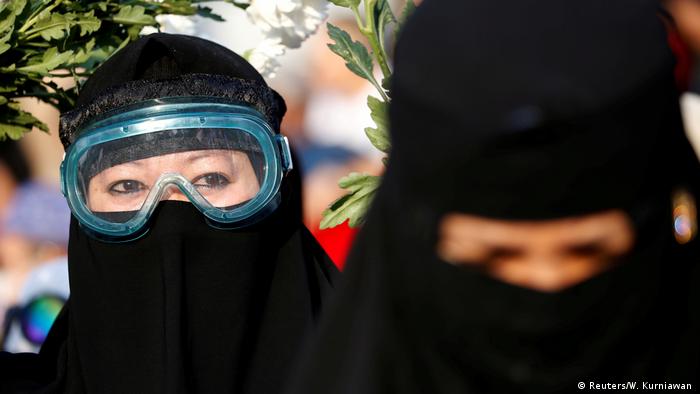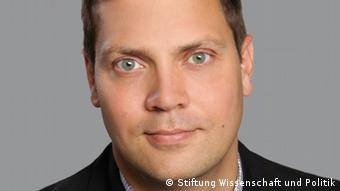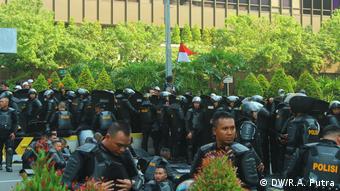The riots with deaths in Jakarta show: Despite the success of the mammoth elections in April, the Indonesian democracy is facing great challenges. DW spoke with the expert Felix Heiduk.

Deutsche Welle: In Jakarta, it is after the announcement of the election results to come in violent protests. They are significantly larger than five years ago, when Joko Widowo, called Jokowi had beaten his Challenger Prabowo Subianto, ever. What does this mean for the political development of the country?
Felix Heiduk: you have to understand That in the context of an increasing polarisation in Indonesia. These protests did not come out of the blue. On the one hand, Prabowo and the Alliance, which he received as an ultra-nationalist and former military with a number of Islamist groups. On the other hand, Jokowi, originally a moderate Reformer who has tried during the election campaign by the nomination of the Vice-President Ma-call amine, which is a conservative Muslim, to parts of the conservative Muslims on his side. This is managed with a view to the results of the election to the part.
Jokowi will govern with a conservative Vice-President of the country for a further five years: What a policy is expected?
During the first term Jokowis he has shown himself not as a liberal Reformer. In Realpolitik, he has not tried the oligarchical encrustation of Indonesia in policy and the economy, to break up, nor has he for the people or the rights of citizens, the press, or freedom of expression used. With a conservative Vice-President, and due to the current demonstrations is to assume that he alone will have to make tactical considerations even more concessions. It will probably give an even more conservative policy.

Felix Heiduk from the Foundation for science and politics (SWP): Jokowi converts on a narrow ridge
Tension between Modernity and religious Tradition
It is Jokowis involvement of conservative forces may have been a clever move to preserve the country from a deeper, possibly violent schism?
In respect of the election and the election result that was certainly a clever move. He has to get votes in regions he has lost last Time with Ma’reputation, support. This means that he has successfully built a bridge? Since I’m not so sure. If you look at this historically, then, there has been the division of the country since the founding of the Republic and even before. It is also reflected in the election results at the regional level. It comes to the philosophical-religious question: What do we want for Islam and what position he should have in the policy? Parts of Indonesia are in favour of a conservative approach, the other a liberal. This question arises not only for Indonesia but also for other Muslim countries such as Egypt.
In other words, how does one combine of Modern and religious traditions? I mean, Indonesia has a feature of a functioning democracy with freedom of speech, of the press and freedom of Assembly so far, good.

Security forces prior to the election authority in Jakarta
What possibilities are there for Jokowi, with the polarization of deal to reduce it, perhaps?
I see three approaches which can track Jokowis government, with the split deal: co-optation, concessions, and Repression.
There are already reports that Prabowo and his entourage, and certain Items and holdings were offered to the new government. This has been in the past. With a kind of horse-trading for Ministerial posts, the state resources, etc. will be given to the ideological is actually the enemy camp, and once an Alliance is formed.
The second approach, are concessions to the conservative Muslim camp, for example, a more Sharia-oriented economic policy. Already, 2018 has been adopted a so-called “Sharia Economic master plan”, the state of micro-lending to the Sharia-compliant companies.
Thirdly, and this has taken place in the last five years, made up the possibility of Repression. Under Jokowi, there was a stronger instrumentalisation of state institutions for the purposes of the vested interests of the government.
Neutrality of the courts and institutions are not always respected
How to explain the anger of the losers of the Election, and how Jokowi will have to respond to that?
The perception of many supporters of prabowo’s is that they have no Chance to score points in a democratic competition. In this perception, they were encouraged by prabowo’s announcement that he will not accept the election results, yet. The institutions of the state, as their Conviction, be unfair, biased and working against you.
And it is true that Jokowis government has not respected the neutrality of the courts and institutions. So, for example, have not been banned Islamist organizations by the courts, but by decree by the President. This undermines the government the real strength of democracy, and their opponents, including Prabowo, arguments at Hand. Prabowo presents himself as a victim and claims him no other choice remained, as the fight on the street in Gzira.
The question here is, how much contradiction can and must withstand the Indonesian democracy? The government of Jokowi converts in this regard, currently a fine line between maintaining a pluralistic Constitution, qua the state Repression against the Islamist forces on the one hand, and concessions to at least part of the Islamist camp, on the other hand, in order to defuse the political pressure. This is not possible, the polarisation of politics could continue to increase..
The political scientist Felix Heiduk is researching the science and politics Foundation in Berlin. His regional focus on Southeast Asia, particularly Indonesia, the Philippines and Thailand.
The Interview was conducted by Rodion Ebbighausen.